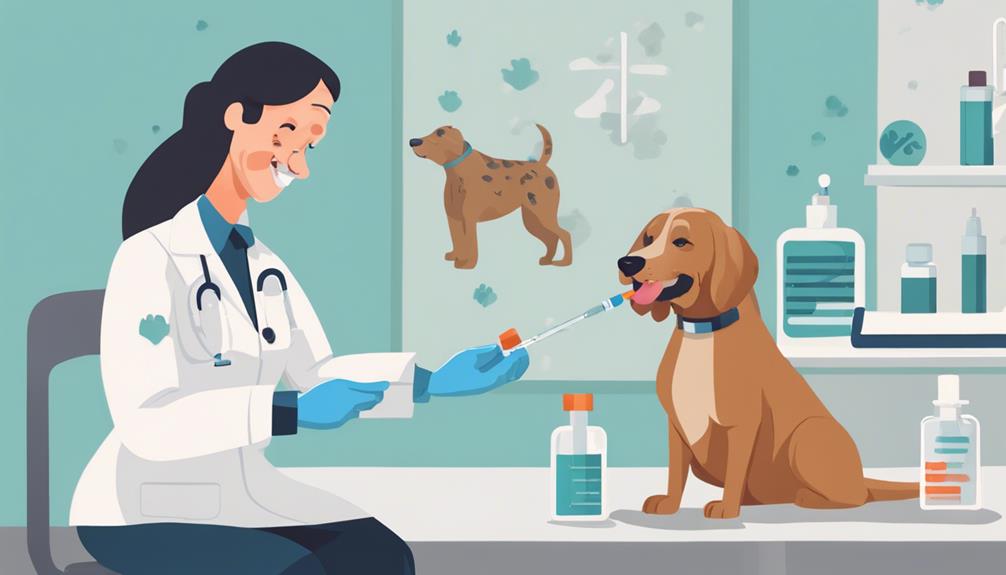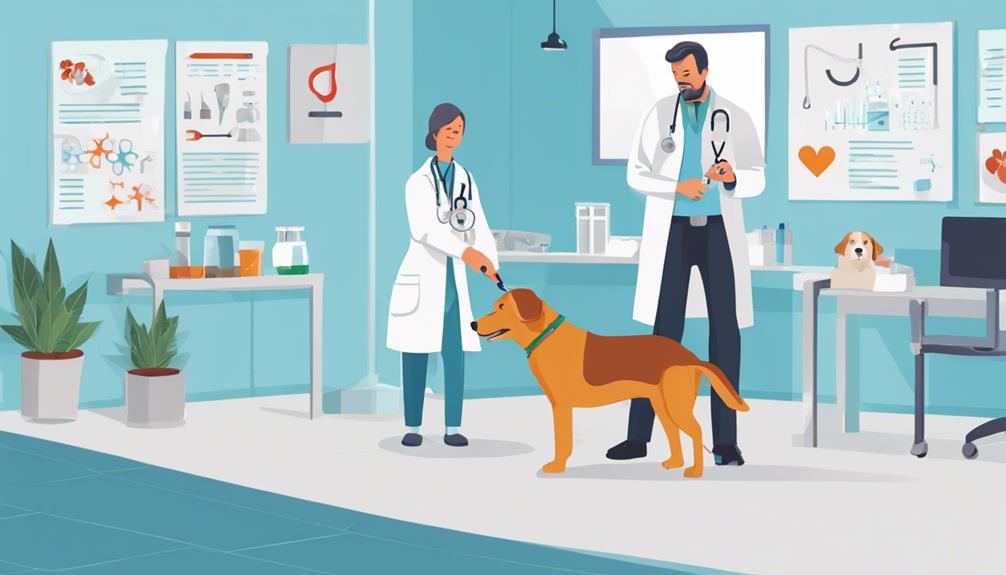10 Best Canine Influenza Vaccinations for Dogs
When safeguarding your dog's health, consider these top canine influenza vaccinations: H3N8, H3N2, bivalent shot, nasal vaccine, and injectable flu immunization. Opt for specialized options like the combination vaccine, H3N8/H3N2, and annual vaccination for added protection. Prioritize preventive care through proactive measures, cleanliness, and vigilant health monitoring. Each vaccine plays a crucial role in ensuring your furry friend's well-being. For detailed benefits, vaccination schedules, and preventive strategies, explore further into canine influenza vaccinations to make informed decisions for your pet's health.
H3N8 Canine Influenza Vaccine
When considering the H3N8 Canine Influenza Vaccine for your dog, consult your veterinarian to determine the best vaccination schedule. Canine flu symptoms can range from mild to severe, including coughing, sneezing, nasal discharge, fever, lethargy, and loss of appetite. In severe cases, pneumonia and difficulty breathing may occur. It's essential to monitor your dog for any signs of canine flu and seek veterinary care if symptoms persist or worsen.
If your dog is diagnosed with the canine flu, there are various treatment options available. Your veterinarian may recommend supportive care such as rest, hydration, and a nutritious diet to help your dog recover. In some cases, antiviral medications and antibiotics may be prescribed to manage symptoms and prevent secondary infections. It's crucial to follow your veterinarian's treatment plan diligently and attend follow-up appointments to ensure your dog's recovery progresses smoothly.
Prevention through vaccination is key to protecting your dog from the H3N8 canine influenza virus. By following the recommended vaccination schedule provided by your veterinarian, you can help strengthen your dog's immune system against this contagious respiratory infection. Regular vaccinations not only safeguard your dog's health but also contribute to the overall well-being of your pet and the community.
H3N2 Canine Influenza Vaccine
To protect your dog from the H3N2 canine influenza virus, consulting with your veterinarian about the appropriate vaccination protocol is crucial. Canine flu symptoms associated with H3N2 include coughing, sneezing, nasal discharge, fever, lethargy, and reduced appetite. This virus can spread easily among dogs through respiratory secretions, contaminated objects, and close contact with infected animals, highlighting the importance of vaccination to prevent its transmission.
Vaccinating your dog against the H3N2 strain of canine influenza can significantly reduce the severity of symptoms if they contract the virus. The vaccine works by stimulating the immune system to produce antibodies that can recognize and fight off the H3N2 virus, providing protection for your furry companion.
Since H3N2 canine influenza can lead to secondary infections like pneumonia, bronchitis, or sinusitis, getting your dog vaccinated is a proactive step in safeguarding their health. By reducing the risk of infection, you not only protect your own pet but also contribute to the collective immunity of the canine community.
Bivalent Canine Influenza Shot
For comprehensive protection against multiple strains of canine influenza, consider the bivalent canine influenza shot for your dog. This dual virus vaccination offers essential canine flu protection by targeting both the H3N8 and H3N2 strains, providing a robust defense against these common influenza viruses in dogs.
The bivalent canine influenza shot is designed to stimulate your dog's immune system to produce antibodies that specifically target the H3N8 and H3N2 strains of the virus. By vaccinating your dog with this dual vaccine, you can help reduce the severity of symptoms, decrease the risk of transmission to other dogs, and potentially prevent infection altogether.
Canine flu protection is crucial, especially in environments where dogs interact closely, such as boarding facilities, dog parks, and training classes. The bivalent canine influenza shot can significantly lower the chances of your dog contracting and spreading the virus, helping to maintain the overall health and well-being of your furry companion.
Consult with your veterinarian to determine the most suitable vaccination schedule for your dog based on their age, health status, and lifestyle. By opting for the bivalent canine influenza shot, you're taking a proactive step in safeguarding your dog against the potentially harmful effects of canine influenza.
Canine Influenza Nasal Vaccine
Administering the canine influenza nasal vaccine provides an effective method for bolstering your dog's immunity against the influenza virus strains. Canine influenza research has shown that the nasal vaccine offers several benefits for your furry companion.
One of the primary advantages of the nasal vaccine is its ability to stimulate a local immune response in the respiratory tract, where the influenza virus primarily attacks. By administering the vaccine intranasally, your dog's immune system is prompted to produce antibodies that target the virus directly at its point of entry, helping to prevent infection and reduce the severity of symptoms.
Additionally, the nasal vaccine for canine influenza has been formulated to be non-adjuvanted, reducing the risk of adverse reactions that may occur with other types of vaccines. This is particularly beneficial for dogs with sensitivities or allergies to vaccine additives.
Furthermore, research on canine influenza vaccines has indicated that the nasal vaccine can provide rapid protection, with immunity developing within a few days after administration. This quick onset of immunity is crucial in high-risk situations, such as boarding facilities or dog shows, where exposure to the virus is more likely.
Injectable Canine Flu Immunization
Administering the injectable canine flu immunization offers an alternative method to protect your dog against influenza strains, complementing the benefits of the nasal vaccine. When considering canine flu prevention strategies, the injectable vaccine plays a crucial role in safeguarding your pet's health. This form of vaccination is administered by a veterinarian through an injection, typically in the muscle of your dog's hind leg.
The benefits of canine flu vaccination through the injectable method are significant. It provides a reliable way to strengthen your dog's immune system against common influenza viruses, reducing the risk of infection and potential complications. Additionally, the injectable vaccine may offer longer-lasting protection compared to other forms of vaccination. By stimulating the production of antibodies, this immunization primes your dog's body to effectively combat the influenza virus upon exposure.
Choosing the injectable canine flu immunization as part of your dog's preventive healthcare routine is a proactive decision that contributes to their overall well-being. Consult with your veterinarian to determine the most suitable vaccination schedule for your furry companion, taking into account their lifestyle, risk factors, and medical history. Prioritizing your dog's health through appropriate vaccinations is a responsible approach to ensuring they lead a happy and healthy life.
Canine Influenza Booster Shot
When discussing the Canine Influenza Booster Shot, ensuring your dog's ongoing protection against influenza strains is paramount. Canine influenza prevention strategies are crucial in safeguarding your furry friend's health. The Canine Influenza Booster Shot serves as a vital component in the overall immunization plan for your dog.
To establish an effective Canine influenza booster schedule, consult with your veterinarian who can tailor a vaccination regimen based on your dog's lifestyle, risk factors, and overall health. Typically, booster shots are recommended annually to bolster immunity against the influenza virus. These booster shots are essential in maintaining strong immunity levels and ensuring your dog is protected against evolving strains of the virus.
Canine Influenza Combination Vaccine

For maximum protection against canine influenza strains, the Canine Influenza Combination Vaccine offers a comprehensive solution to bolster your dog's immunity. This vaccine is designed to provide broad coverage against multiple strains of the canine influenza virus, including H3N8 and H3N2.
Here are some key points to consider regarding the Canine Influenza Combination Vaccine:
- Comprehensive Protection: By combining antigens from different strains of the canine influenza virus, this vaccine can enhance your dog's immune response and reduce the severity of symptoms if exposed to the virus.
- Convenience: Instead of administering multiple vaccines separately, the combination vaccine streamlines the vaccination process, reducing the number of shots your dog needs to receive.
- Cost-Effective: Opting for a combination vaccine can be more cost-effective than purchasing individual vaccines, making it a practical choice for pet owners looking to protect their dogs against canine influenza.
- Long-Lasting Immunity: The Canine Influenza Combination Vaccine is formulated to provide your dog with lasting immunity against multiple strains of the virus, offering peace of mind and protection for an extended period.
Canine Influenza H3N8/H3N2 Vaccine
To further fortify your dog's defenses against canine influenza strains like H3N8 and H3N2, consider the Canine Influenza H3N8/H3N2 Vaccine for comprehensive protection. Canine flu prevention strategies are crucial in safeguarding your furry friend from potential outbreaks. This vaccine is designed to specifically target the H3N8 and H3N2 strains, providing a robust immune response to combat these viruses effectively.
Canine flu outbreak risks are a real concern, especially in environments where dogs interact closely, such as boarding facilities, dog parks, or training classes. The Canine Influenza H3N8/H3N2 Vaccine plays a vital role in reducing the spread of these contagious viruses by minimizing the severity and duration of the illness if your dog is exposed. By administering this vaccine, you not only protect your pet but also contribute to the overall prevention of canine influenza outbreaks in the community.
Ensure your dog's well-being by discussing with your veterinarian the suitability of the Canine Influenza H3N8/H3N2 Vaccine based on your pet's lifestyle and individual risk factors. Stay proactive in your approach to canine flu prevention by staying informed about vaccination recommendations and outbreak alerts in your area. By taking these preventive measures, you can help keep your dog healthy and happy.
Canine Influenza Annual Vaccination

Consider scheduling your dog's annual Canine Influenza vaccination to maintain their immunity against prevalent strains and protect their overall health. Staying up to date with the latest advancements in Canine flu updates and prevention strategies is crucial to safeguarding your furry friend's well-being.
Here are four essential points to keep in mind regarding Canine Influenza annual vaccinations:
- Regular Updates: Stay informed about the current strains of Canine influenza that are prevalent in your area. Vaccines are often updated to provide protection against the latest strains, ensuring that your dog is shielded from the most recent threats.
- Preventive Measures: Annual vaccinations are key in preventing the spread of Canine influenza among the dog population. By vaccinating your pet regularly, you not only protect them but also contribute to the overall reduction of the disease's prevalence.
- Vaccine Effectiveness: Canine flu vaccines have been shown to be effective in reducing the severity of symptoms and the risk of complications associated with the disease. Keeping up with annual vaccinations can significantly enhance your dog's defense against the virus.
- Duration of Protection: While the duration of immunity provided by Canine Influenza vaccines may vary, annual vaccinations are typically recommended to ensure continuous protection. Consulting with your veterinarian can help determine the most suitable vaccination schedule for your dog based on their individual needs.
Canine Influenza Preventive Care
Maintaining your dog's health against Canine Influenza involves proactive preventive care measures. Canine flu prevention is crucial in safeguarding your furry friend from this contagious respiratory disease. Apart from annual vaccinations, there are other steps you can take to minimize the risk of your dog contracting the flu.
Firstly, ensure that your dog's environment is clean and well-ventilated. Canine flu spreads easily in places where dogs congregate, so regular cleaning of toys, bedding, and common areas is essential. Additionally, practicing good hygiene, such as washing your hands after handling other dogs, can help prevent the spread of the virus.
Another vital aspect of preventive care is monitoring your dog's health. Keep an eye out for symptoms like coughing, sneezing, lethargy, and fever, as early detection can lead to prompt treatment and containment of the illness. If you suspect your dog may have the flu, isolate them from other pets and seek veterinary advice immediately.
While vaccinations play a significant role in protecting your dog, it's essential to understand that no vaccine provides 100% immunity. However, vaccination effectiveness can significantly reduce the severity of symptoms if your dog does contract the flu. By combining vaccinations with good hygiene practices and vigilant monitoring, you can create a robust defense against Canine Influenza for your beloved pet.
Frequently Asked Questions
Can Canine Influenza Vaccines Cause Allergic Reactions in Dogs?
If your dog experiences allergic reaction risks from vaccines, it's crucial to monitor them closely. Vaccination protocols should be followed diligently. Some dogs may be sensitive to certain components of vaccines, leading to potential reactions.
Consult your vet about your dog's specific needs and any concerns you have. Proper monitoring and communication with your vet can help mitigate any risks associated with canine influenza vaccinations.
Are There Any Side Effects Associated With the Bivalent Canine Influenza Shot?
When considering the bivalent canine influenza shot, it's essential to be aware of potential risks. Side effects may include mild symptoms like soreness or lethargy. However, severe reactions are rare.
Following a monitoring protocol post-vaccination is advisable. If you notice any concerning signs, such as persistent vomiting or difficulty breathing, contact your vet promptly.
What Is the Recommended Age for Starting Canine Influenza Vaccinations?
When it comes to puppy vaccinations, starting canine influenza vaccinations at the right age is crucial for optimal protection.
The recommended age for initiating these vaccinations is typically around 6-8 weeks old.
At this stage, puppies are more susceptible to infections, and by vaccinating early, you can help boost their immune response against the virus.
Following a proper vaccine schedule ensures that your furry friend receives the necessary protection against canine influenza.
Can a Dog Receive Multiple Canine Influenza Vaccines at Once?
Yes, your dog can receive multiple canine influenza vaccines at once, depending on the vaccine schedule recommended by your veterinarian. When given together, the vaccines stimulate your dog's immune response to build protection against the virus.
It's crucial to follow your vet's guidance on the timing and dosage of the vaccinations to ensure your dog's immune system can effectively respond and create the necessary defenses against canine influenza.
How Long Does Immunity From Canine Influenza Vaccinations Last?
After receiving a canine influenza vaccine, immunity duration can vary. Typically, protection lasts for about a year. Booster shots are recommended to maintain immunity levels.
Vaccine effectiveness can depend on the specific strain of the virus, as there are different variations. It's crucial to follow your veterinarian's guidance on vaccination schedules to ensure your dog stays protected against canine influenza.
Conclusion
In conclusion, protecting your dog from canine influenza is crucial for their health and well-being. By choosing the best vaccination for your furry friend, you can help prevent the spread of this highly contagious virus and keep them safe.
Consult with your veterinarian to determine the most suitable option for your dog's specific needs and ensure they receive the necessary preventive care to stay healthy.
